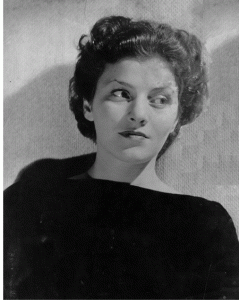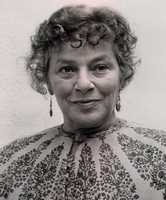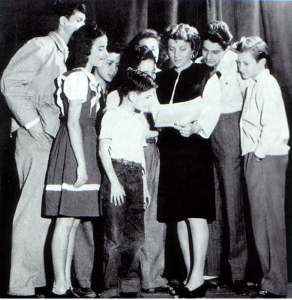VIOLA SPOLIN

Biography 
Born Nov. 7, 1906- Chicago Ill.
Died Nov. 22, 1994-Los Angeles, CA
Theater educator, director, and actress recognized internationally for her “Theater Games” system of actor training, was raised in a tradition of family theater amusements, operas, and charades. Viola Spolin trained initially (1924-26) to be a settlement worker, studying at Neva Boyd’s Group Work School in Chicago. Boyd’s innovative teaching in the areas of group leadership, recreation, and social group work strongly influenced Spolin, as did the use of traditional game structures to affect social behavior in inner-city and immigrant children.
While serving as drama supervisor for the Chicago branch of the Works Progress Administration’s Recreational Project (1939-1941), Spolin perceived a need for an easily grasped system of theater training that could cross the cultural and ethnic barriers within the WPA Project. Building upon the experience of Boyd’s work, she responded by developing new games that focused upon individual; creativity, adapting and focusing the concept of play to unlock the individual’s capacity for creative self-expression. These techniques were later to be formalized under the rubric “Theater Games.” “The games emerged out of necessity,” she has said. “I didn’t sit at home and dream them up. When I had a problem [directing], I made up a game. When another problem came up, I just made up a new game. (Interview,Los Angeles Times, May 26 , 1974)

Viola with her Young Actors (note: Alan Arkin is 3rd from the left and Alan Alda 2nd from the right, looking over her shoulder)
In 1946 Spolin founded the Young Actors Company in Hollywood.
Children six years of age and older were trained, through the medium of the still developing Theater Games system, to perform in productions. This company continued until 1955, when Spolin returned to Chicago to direct for the Playwrights Theater Club and subsequently to conduct games workshops with the Compass, the country’s first professional, improvisational acting company. From 1960 to 1965, still in Chicago, she worked with Paul Sills (her son) as workshop director for his Second City Company and continued to teach and develop Theater Games theory. As an outgrowth of this work, she published Improvisation for the Theater (1963), consisting of approximately two hundred and twenty games/exercises. It has become a classic reference text for teachers of acting, as well as for educators in other fields. In 1965 she co-founded the Game Theater in Chicago, again working with Sills. Open only one evening a week, the theater sought to have its audiences participate directly in Theater Games, thus effectively eliminating the conventional separation between improvisational actors and audiences who watched them. The experiment achieved limited success, and the theater closed after only a few months.
In 1970 – 1971 Spolin served as special consultant for productions of Sills’s Story Theater in Los Angeles, New York, and on television. On the West Coast, she conducted workshops for the companies of the Rhoda and Friends and Lovers television series and appeared as an actress in the Paul Mazursky film Alex in Wonderland (MGM 1970).
In November 1975 the publication of the Theater Game File made her unique approaches to teaching and learning more readily available to classroom teachers; in 1976 she established the Spolin Theater Game Center in Hollywood, serving as its artistic director. In 1979 she was awarded an honorary doctorate by Eastern Michigan University, and until recently she has continued to teach at the Theater Game Center. In 1985 her new book, Theater Games for Rehearsal: A Director’s Handbook, was published.
Spolin’s Theater Games are simple, operational structures that transform complicated theater conventions and techniques into game forms. Each game is built upon a specific focus or technical problem and is an exercise that militates against the artifice of self-conscious acting.
The playing (acting) emerges naturally and spontaneously; age, background, and content are irrelevant. The exercises are, as on critic has written, “structures designed to almost fool spontaneity into being” (Review, Film Quarterly, Fall/Winter 1963) By themselves, the games have liberating effect (accounting for their wide application in self actualization contexts); within the theater context, each clearly fosters a facet of performance technique. There are games to free the actor’s tension, games to “cleanse” the actor of subjective preconceptions of the meaning of words, games of relationship and character, games of concentration – in short, games for each of the area with which the growing actor is concerned. Key to the rubric of Spolin games are the terms physicalization (“showing and not telling”), spontaneity (“a moment of explosion”), intuition (“unhampered knowledge beyond the sensory equipment – physical and mental”), audience (“part of the game, not the lonely looker – onners”), and transformation (“actors and audience alike receive .. the appearance of a new reality”) To achieve their purpose, Theater Games need only the rules of the game, the players both actors and audience are considered to be players), and a space in which to play. Beyond the very tangible pleasures of “playing” which the games encompass, they also heighten sensitivity, increase self-awareness, and effect group and interpersonal communication. As a result, Spolin’s games have developed currency beyond actor training, that is, in encountering techniques, self-awareness programs, and nonverbal communication studies. Viola Spolin’s systems are in use throughout the country not only in university, community, and professional theater training programs, but also in countless curricula concerned with educational interests not related specifically to theater.
The list of Spolin’s guest lectures, demonstrations, and workshops is extensive. She has introduced her work to students and professionals in theater, elementary and secondary education, schools for gifted and talented programs, curriculum studies in English, religion, mental health, psychology, and in centers for the rehabilitation of delinquent children. She notes that “Theater Games are a process applicable to any field, discipline, or subject matter which creates a place where full participation, communication, transformation can take place” (Los Angeles Times, May 26 1974) Exemplary of the broad recognition her work has received are a 1966 New England Theater Conference Award citing “contributions to theater, education, mental health, speech therapy, and religion,” and the 1976 award by the Secondary School Theater Association of its highest honor; the Founders Award. In her devotion to the development and application of Theater Games, Spolin has made a unique contribution to American theater. Written by D.E. Moffit
Viola Spolin’s publications are
- Improvisation for the Theater (Northwestern University Press, 1963; 3rd Ed., 1999)
- Theater Game File (Northwestern University Press, 1989)
- Theater Games for Rehearsal – A Director’s Handbook (Northwestern University Press 1985; Updated Ed., 2011)
- Theater Games for the Classroom – A Multimedia Teacher’s Guide (Northwestern University Press 2003)
- Theater Games for the Classroom: A Teacher’s Handbook (Northwestern University Press, 1986)
Selected sources of comment about Viola Spolin’s work are Hans G. Furth, Piaget for Teachers (1970); Jeffrey Sweet,Something Wonderful Right Away (1978); and Yale Theater (Spring 1974). See also the interview by Barry Hyams in the Los Angeles Times (May 26, 1974) and the review of Theater Games for Rehearsal, “Playing Viola,” by Joan D. Lynch in American Theater (December 1985).
Reprinted from Notable Women in the American Theatre Greenwood Press

